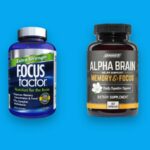
Table of Contents
Introduction
Nootropics are substances that improve cognitive performance and mental well-being. They are generally safe but should be used cautiously because some may have side effects. Nootropics are sometimes marketed to college students as “smart drugs”. Some people may confuse nootropics with illegal drugs, such as cocaine or Adderall.
However, nootropics are very different from illegal drugs. They contain natural ingredients and do not produce harmful side effects when used correctly. Most students start taking a nootropic at the beginning of their college careers to help them perform better in school and achieve more success. Nootropics are usually associated with improving memory and attention, but they can also be used to improve concentration and creativity. They can even help reduce stress and anxiety! There are many different brands of nootropics available.
This article provides an in-depth review of seven of the best nootropics for studying. Each product will be reviewed in detail, along with the benefits and drawbacks of each supplement.
Best Nootropics For Studying
Bacopa Monnieri
Since time immemorial, Bacopa Monnieri has been employed in Ayurvedic medicine to alleviate diverse conditions such as insomnia and anxiety. In both animals and humans, this plant has demonstrated its ability to enhance brainpower and memory. Bacopa is well-known for its positive impact on memory retention and cognition. In addition, it has proven to be a potent stress-reliever and anxiety-reducer, making it an exceptional nootropic for academic pursuits. Given its multifarious benefits, it is often paired with other nootropics. Its high antioxidant composition makes it a prime candidate for supplementation alongside another nootropic called fish oil.
L-Theanine
L-theanine, an amino acid that is typically present in green tea, performs its function by elevating the levels of the neurotransmitter GABA in the brain, which counterbalances the effects of excess glutamate and propels feelings of relaxation. Various research endeavors suggest that this compound holds the potential to lessen anxiety and improve memory function. For instance, individuals who were administered L-theanine before an examination were observed to recall a greater number of questions and achieve higher scores on the exam than those who were not given it. Besides, L-theanine has been discovered to be efficacious in the treatment of various psychiatric disorders such as depression, bipolar disorder, schizophrenia, and PTSD. Moreover, L-theanine is believed to not only bolster the cognitive abilities but also amplify motivation and willpower.
Level up your mind.
Rhodiola Rosea
Rhodiola Rosea is a species of flowering plant that grows in cold climates in the northern hemisphere. It has been used for thousands of years in traditional medicine to treat various ailments, including fatigue, anxiety and depression. Studies show that it is effective at treating these conditions because it has potent neuroprotective and antioxidant properties. It also increases blood flow to the brain and improves mental clarity. In addition, studies have shown that taking Rhodiola Rosea supplements can improve memory and learning ability in people with difficulty concentrating and retaining information. For this reason, it is commonly used as a nootropic ingredient by students and other people who want to improve their concentration and cognitive performance.
Citicoline
Citicoline is a naturally-occurring substance found in several foods, including red meat, seafood, fruits and vegetables. It is commonly used to treat cognitive impairment caused by Alzheimer’s disease and other age-related disorders. It also helps improve memory and mental sharpness in older people.
Citicoline is known to help with studying because research has shown that it can increase brain-derived neurotrophic factor (BDNF) levels and increase the growth of new neurons. This is particularly important for young people who are still growing and developing their nervous systems. BDNF has been extensively studied in recent years because of its amazing potential to treat a wide range of cognitive-related disorders.
Additionally, studies have shown that citicoline can reduce oxidative stress and inflammation in the brain. This helps protect the neurons from damage and prevents further cognitive decline. While more research is needed to determine its exact effects, early studies suggest that citicoline can significantly impact memory function and cognitive performance.
L-Tyrosine
L-Tyrosine is also popular for studying because it enhances focus and attention and reduces stress and fatigue. It also helps increase dopamine levels and improve memory retention. L-tyrosine is safe and natural and helps support optimal brain function and concentration. It is available in capsule form and should be taken on an empty stomach for best results. L-tyrosine can also help treat other health conditions, such as anxiety and depression. Studies have shown that L-tyrosine can boost energy levels and reduce feelings of fatigue. It has been used to improve memory and relieve anxiety in people of all ages. L-tyrosine is also known for its anti-inflammatory and antioxidant properties that can help protect the brain from free radicals. There are many benefits of L-tyrosine. These include increased energy and alertness, improved sleep and reduced stress levels. Many people find that L-tyrosine can improve their memory and cognition and help them focus better at work or studying.
KEY TAKEAWAY
Nootropics can indeed help with studying. But, in general, all these nootropics are safe. They don’t have any significant side effects in the recommended doses.
They are, therefore, an excellent way to increase your concentration and improve your memory so that you can learn more effectively. The effects of these supplements can vary from person to person, however, and you should consult your doctor before starting any supplement.








